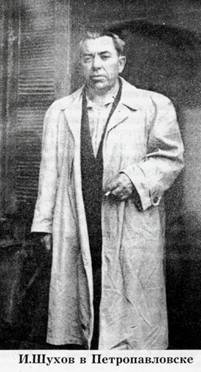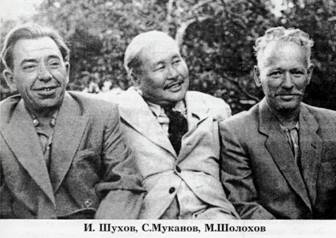About the life and creative path of Ivan Shukhov
Share:
Qazaqstan has long been a cradle for writers of many nationalities. Among them - the Siberian Cossack Ivan Shukhov. (The Siberian Cossacks’ army defended the borders of the Russian Empire from the nomads and fulfilled the military-colonizing functions).

Ivan Shukhov was born on July 31, 1906 in the village of Presnovka, located near to Petropavlovsk (a city in northern part of Qazaqstan). His father Peter Shukhov was a senior shepherd. His mother, Ulyana Shukhova, being completely illiterate, knew many Russian folk tales, jokes, sayings, songs.
Ivan Shukhov as a boy traveled a lot with his father in the Qazaq steppe, he reflected his impressions in the autobiographical book under a title ‘Pages about Life in Presnovka’, his stories and novels.
Ivan Shukhov studied at the Petropavlovsk Pedagogical Specialized School, then entered the working man's college in Omsk and completed the Literary Institute in Moscow. Starting from the end of the 20s, the future writer worked as a journalist. Later on he would note about that period of time: ‘I came to the literature after being a journalist’.
The impressions of childhood, youth and his life experience were reflected in the first two novels by Ivan Shukhov: ‘A Bitter Line’ and ‘Hate’, published in 1931.
The novels of the young writer were highly appreciated by Maxim Gorky (‘You seemed to be a spectator and participant in all events, overheard all thoughts, understood all the feelings of all your heroes’) and were published several times. In 1935 - the book ‘The Motherland’, in 1940 -‘The Army in Force’ appeared.
After the Second World War, one after another were published such books, as: ‘The Appearance of the Day’, ‘The Golden Bottom’, ‘The Motherland and The Foreign Land’. Along with doing writings Ivan Shukhov translated into Russian language works of such famous Qazaq writers, as Mukhtar Auezov, Sabit Mukanov, Gabit Musrepov, Gabiden Mustafin.
Ivan Shukhov had many friends among Qazaq writers, but the closest was the friendship with his fellow countryman and neighbor Gabit Musrepov, who wrote in his memoirs: ‘We often visited each other, because we lived side by side for about fifteen years’.

Implementation in Qazaqstan of ‘Virgin Lands’ program pushed Ivan Shukhov to write new writings. He wrote one after another collections of essays ‘Conquerors of the Virgin Lands’, ‘The Golden Bottom’, ‘The Steppe Weekdays’. The Past and the Present of the Qazaq steppe were colorfully described by the gifted author.
His essays were printed on the pages of ‘Pravda’ newspaper and other central newspapers. Ivan Shukhov is known as the author of the books ‘Days and Nights of America’ and ‘The Breath of the Adriatic’, written after his trips to America and Yugoslavia. His last years he worked on the book ‘Pages about Life in Presnovka’, which included three novels: ‘The Bell’, ‘The Grass in the Open Field’, ‘A Blinked Haze’, for which he was awarded the State Prize of the Qazaq SSR in 1977.
In 1963, Ivan Shukhov headed the ‘Prostor’ republican magazine, which soon became famous and popular throughout the Soviet Union. Eleven years of his editing, Ivan Shukhov published works that the editorial board of the prestigious in the world of literature the ‘Novy Mir’ magazine did not always decide to print. He published works of already well-known and not very famous Qazaq writers, published new translations, prose and poems, including works of: Olzhas Suleimenov, Anuar Alimzhanov and Satimzhan Sanbayev.
‘When I was told that you ... show interest in my husband's work, I could not stand it - I cried for the first time in three decades. It was tears of joy ...’ - wrote to Ivan Shukhov Zuleykha, a wife of Magzhan Zhumabayev, a famous Qazaq writer.
A lot of such letters of thanks are kept in the writer's archive. Particularly they were from Nadezhda Mandelstam, from Marina Tsvetaeva’s daughter, from Konstantin Balmont’s daughter, from Yuri Kazakov, from Konstantin Paustovsky and Yuri Dombrovsky and etc.
Ivan Shukhov was laconic in conversation, stingy with words, but he knew well the value of sincere feelings.
Share: